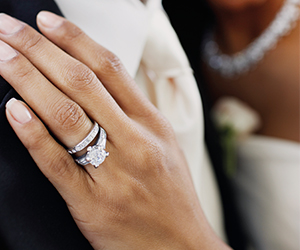Ciska Thurman looks at the legal, financial and emotional reasons to tie the knot … or not
 The concept of marriage has come to mean many different things to different people. Walking down the aisle in a billowy white dress, or enjoying the bragging rights that come with acquiring a ‘Mrs’, are fleeting – marriage is a lifelong merger that requires careful maintenance. Is our high divorce rate a sign that young people today just aren’t in it for the long haul? Or do we need to shift our thinking to assimilate new variations on the traditional nuclear family?
The concept of marriage has come to mean many different things to different people. Walking down the aisle in a billowy white dress, or enjoying the bragging rights that come with acquiring a ‘Mrs’, are fleeting – marriage is a lifelong merger that requires careful maintenance. Is our high divorce rate a sign that young people today just aren’t in it for the long haul? Or do we need to shift our thinking to assimilate new variations on the traditional nuclear family?
Opposite sides of the spectrum
Helen Clegg, 34, and Ben Hitchins, 36, have remained committed to one another for 10 years, and have lived in as many countries during that time. ‘We never decided not to marry. It just hasn’t happened. Some couples get married to feel more secure in their relationship. We don’t feel that marriage will transform our relationship in any way,’ explains Helen. She and Ben welcomed a baby boy, Samuel, in January 2012.
Alex Parker, 29, and Michael Williams, 33, moved in together after four months of dating, and have been happy ever since. Says Alex, ‘When we knew we wanted to share our lives together, we felt that a wedding and a marriage were a convenient package for doing that: a public declaration of our love for each other, and a certificate to assist us with all the bureaucracy around our desire to adopt one day.’
Legal affairs
In South Africa today, a domestic partnership (living together, or a ‘common-law marriage’, like in other countries) doesn’t afford you the same rights as being married does. Whereas our law recognises the union of same-sex couples and even some polygamous unions, no amount of time living with another person will automatically convert a cohabitation into a marriage.
‘However,’ notes lawyer Judy Jordaan, ‘owing to the increasing tendency of couples cohabiting without marrying, legislation has now been drafted (the Domestic Partnership Bill 36 of 2008) which is awaiting enactment into law.
In the interim, in order to protect themselves against a break-up, a lot of couples are opting to enter into a cohabitation contract, also known as a “domestic partnership agreement”, which regulates their terms of living together: finances, children and maintenance property, as well as any conditions surrounding the termination of the relationship.’
Money talks
‘The most immediate downside about getting married, for us, is the expense of a wedding,’ explains Helen. ‘We don’t want our families to pay our wedding costs and our primary priority at this stage of our lives is providing for little Samuel.’
Many other young couples share this sentiment. They’re waiting until they themselves are in a financial position to pay for the wedding they want, rather than feeling as if they have to merely play a role in something far more traditional since their family is paying for it. As a result, weddings are becoming smaller, more personal and less conventional (in terms of values, venues and vows).
As far as the financial protection afforded by marriage goes, this is by no means automatic. Would-be spouses need to sign an antenuptial contract to ensure that they each maintain a separate estate of assets and liabilities. If they neglect to seek legal intervention to do so, then by default, all of their assets and their liabilities (even those they acquired before the marriage) are merged into a single estate, in which each spouse has an undivided half-share. As with pursuing a domestic part- nership agreement, the onus is on the couple to protect themselves.
Hitched or unhinged?
So it seems as if such a domestic partnership can often resemble a marriage – legally and financially – very closely (assuming considered intervention in both instances). However, the societal pressure to marry and the stigma attached to those who are ‘living in sin’ is still very real. ‘Getting hitched’ seems to automatically shroud newly-weds in acceptance. And so this routine ‘next step’ is often the unconsidered and easy path many couples take.
For other couples, getting married is truly and personally significant – for religious, cultural and relational reasons. Ultimately, couples should identify what marriage means to them (not to their lawyers, financial advisors or friends and family) and remain true to that.
For Alex and Michael, it’s about the journey they embarked on to prepare for marriage. ‘Planning a wedding and our lives beyond that event strengthened our relationship. We sat down and discussed what we would like and expect from our marriage and each other. We drew up goals, short and long term, for our future. In writing our own vows we had to think very deeply about promises that we could keep for the rest of our lives,’ says Alex.
And for Helen and Ben, marriage has become fairly inconsequential either way. Says Helen, ‘Our main focus is keeping our relationship alive. We have fun together – we laugh a lot. We have shared goals and dreams that we discuss often. The financial and legal benefits are not of great importance to us. The emotional benefits would remain the same to us – whether we were married or not.’
SA marriage facts and stats
• In 2006, South Africa became the fifth country in the world to allow same-sex marriage.
• The Recognition of Customary Marriages Act (1998) allows for the registration of marriages under African customary law. Some communities have customary laws that allow for polygamous marriages.
• According to the 2011 census, of South Africans aged 20 or older, 43.7% had never been married, 36.7% were married at the time of the census, 11% were living together like married partners, 5.7% were widowed, 0.9% were separated and 1.9% were divorced.





